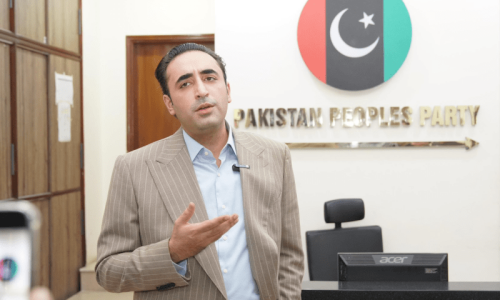WASHINGTON, Sept 25: Former prime minister Benazir Bhutto said on Tuesday that a Pakistan People’s Party government would give the Vienna-based UN nuclear watchdog access to Dr A.Q. Khan who lives under house arrest in Islamabad.
“The International Atomic Energy Agency would have the right to question A.Q. Khan,” not Western governments, said Ms Bhutto when asked at a Washington gathering if she would allow representatives from the United States and other Western countries to interrogate the nuclear scientist.
Giving access to the IAEA, she said, would satisfy the international community desiring to know more about the network of nuclear proliferators Dr Khan allegedly headed.
Ms Bhutto recalled that Dr Khan had confessed to violating the law which prevented him from sharing Pakistan’s nuclear secrets with anyone. She said that a future PPP government would also hold parliamentary hearing to determine if Dr Khan alone was responsible for selling Pakistan’s nuclear secrets to other states or “other elements were also involved.”
Ms Bhutto also said that she has asked PPP stalwart Makhdoom Amin Fahim to file nomination papers as the party’s candidate for the Oct. 6 presidential election while Nawabshah’s mayor Faryal Talpur will be his covering candidate.
She announced a three-point strategy for the presidential election: participation, abstaining and resigning from the national and provincial assemblies.
She offered three conditions to President Gen Pervez Musharraf for PPP’s support and said that his response would determine which of the three choices her party would opt for.
The conditions she offered to Gen Musharraf include the demand for him to resign from the post of the army chief, revoke the two-term ban on the re-election of a prime minister and offer an across-the-board amnesty for all political leaders. The president is required to announce his response before the presidential election scheduled for Oct. 6.
She said if Gen. Musharraf decided to retain both the posts, that of the army chief and the president, then PPP will have no option but to resign from the national and provincial assemblies. If the president responded positively, “then we will not resign, whether rest of the opposition does,” she added.
Ms Bhutto said the PPP had decided to field a candidate for the presidential election because it wanted to remain in the political process and have the option to decide what to do in case Gen Musharraf did not accept its demands. “We are doing this because we want to put ourselves in a better position to have more options. The issue of General Musharraf’s legitimacy is foremost in the minds of Pakistani people,” she told a meeting of the Middle East Institute at the Russell Senate Building in Washington.
“So as a precaution, we are filing our candidate,” she said, while noting that President Musharraf has enough support in the current assemblies to win. Throughout her speech, and later in the long Q & A session, Ms Bhutto was very critical of the government. Her harsh tone and bitter remarks apparently betrayed her frustration with the dialogue she is holding with the government on a power-sharing arrangement.
Earlier, when Ms Bhutto arrived at the Senate building, flanked by her husband Asif Zardari and a former PPP Senator Khwaja Akbar, she received a standing ovation from a select gathering of US lawmakers, diplomats, academics and media representatives. This contrasted sharply with her previous visits to the US capital when she received little attention.
Despite Washington’s renewed interest in her, Ms Bhutto strongly criticised the United States for supporting President Musharraf, calling it “a strategic miscalculation.” She said her country faces a critical choice in coming weeks between dictatorship and democracy and the US should support the forces of democracy.
Ms Bhutto said that Gen. Musharraf has tried to convince the world that only he stands in the way of extremists hoping to overrun nuclear-armed Pakistan.
“In fact, military rule is the cause of the anarchic situation in Pakistan,” she said. Dictators need crisis to perpetuate their rule and therefore have an interest in keeping extremism alive, she added.
Ms Bhutto said President Musharraf has undermined the judiciary by removing judges and has forced people to radical mosques by dismantling other paths of dissent. She said she was confident of her safe return as unlike former prime minister Nawaz Sharif, she had not been sentenced to jail on criminal charges under the Musharraf regime. But she added: “I hope for the best, and prepare for the worst.
“I’m returning to Pakistan on October 18 to coalesce the forces of moderation against extremism,” she said, adding that her goal was “quite literally to save democracy in Pakistan”.
Pledging to overhaul Pakistan’s schools and economy if re-elected prime minister, Bhutto said also that under Musharraf, Pakistan had become “the Petri dish of the international extremist movement.” Fighting the Taliban and al-Qaeda “requires a national effort that can only flow from legitimate elections,” she said.












































Dear visitor, the comments section is undergoing an overhaul and will return soon.